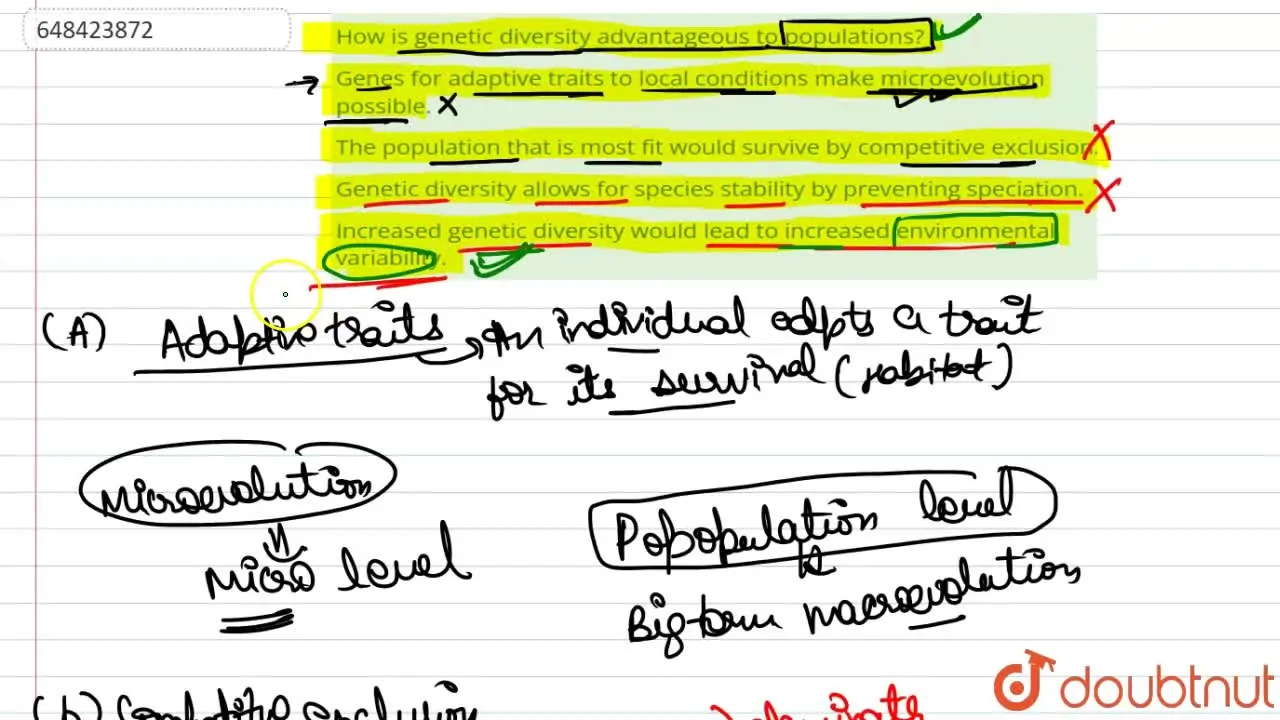How is genetic diversity advantageous to populations?
Genes for adaptive traits to local conditions make microevolution possible.
The population that is most fit would survive by competitive exclusion.
Genetic diversity allows for species stability by preventing speciation.
Increased genetic diversity would lead to increased environmental variability.
The correct Answer is:A
Step by step video & image solution for How is genetic diversity advantageous to populations? by Biology experts to help you in doubts & scoring excellent marks in Class 11 exams.
Related Playlists
- BOOK - AAKASH SERIESCHAPTER - BIODIVERSITY AND CONSERVATIONEXERCISE - EXERCISE-I The Importance of Species Diversity to the Ecosystem9videos
BIODIVERSITY AND CONSERVATION
- BOOK - AAKASH SERIESCHAPTER - BIODIVERSITY AND CONSERVATIONEXERCISE - EXERCISE-I Loss of Biodiversity28videos
BIODIVERSITY AND CONSERVATION
- BOOK - AAKASH SERIESCHAPTER - ANIMAL KINGDOM EXERCISE - EXERCISE -III (Previous AIPMT/NEET Questions)35videos
ANIMAL KINGDOM
- BOOK - AAKASH SERIESCHAPTER - BIOLOGICAL CLASSIFICATIONEXERCISE - EXERCISE-III (Previous AIPMT/NEET Question)37videos
BIOLOGICAL CLASSIFICATION
Similar Questions
What is genetic diversity ?
View SolutionHow is parthenogenesis advantageous to some plants?
View SolutionGenetic diversity is related to
View SolutionWhat does the term genetic diversity refer to? What is the significance of large genetic diversity in a population?
View SolutionWhich of the following ways is most likely to decrease the genetic diversity in a population ?
(a) Gene mutation
(b) Genetic recombination
(c) Stabilising natural selection
(d) Immigration of individualsView SolutionWhat is alpha/beta diversity in an ecosystem ? What is the significance of large genetic diversit in a population ?
View SolutionIdentify the following statements is true ( T) or false (F ) for genetic diversity and select the correct option :
(A) Genetic diversity is a diverstiy shown by a single species at
genetic level
( B ) It is total genetic information contained in all individuals of a community.
( C ) Rauwolfia vomitoria shows the variation in the term of concentration of active chemical reserpine.
(D) India has more than 50000 genetically different strains of mango.View SolutionHow is distribhution more advantageous than evaporation?
View SolutionHow are the transgenic animals advantageous to us?
View SolutionHow would the gene flow or genetic drift affect the population in which either of them happen to take place ?
View Solution


